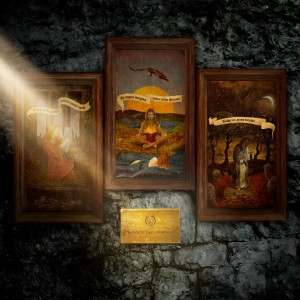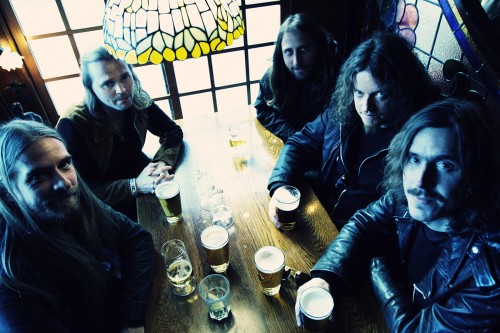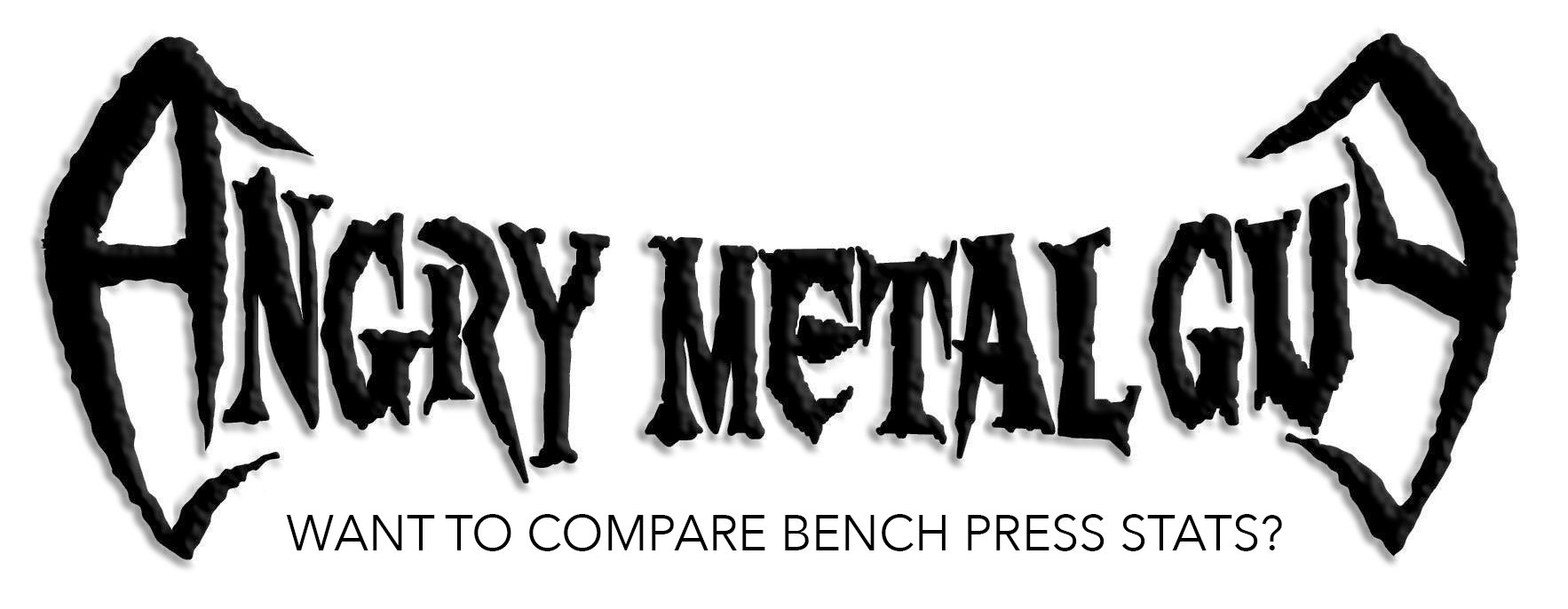 Back in 2011 Opeth released a record entitled Heritage that demonstrated that people get really weird about music, and particularly about reviews of bands they love. The voluminous comment thread on my review of the record is a testament to the fact that Heritage was well-loved by some: and that group had OPINIONS. The discussion was remarkable for being quite ad hominem, irrational and genuinely lame. People who obviously never read the review looked at the score (a 2/5) and decided that I was a “butthurt” death metal guy who can’t handle change. The general foaming-at-the-mouth tone from fans of the band was astounding, but not surprising. Opeth has long inspired devotion in its fans, including myself, of course.
Back in 2011 Opeth released a record entitled Heritage that demonstrated that people get really weird about music, and particularly about reviews of bands they love. The voluminous comment thread on my review of the record is a testament to the fact that Heritage was well-loved by some: and that group had OPINIONS. The discussion was remarkable for being quite ad hominem, irrational and genuinely lame. People who obviously never read the review looked at the score (a 2/5) and decided that I was a “butthurt” death metal guy who can’t handle change. The general foaming-at-the-mouth tone from fans of the band was astounding, but not surprising. Opeth has long inspired devotion in its fans, including myself, of course.
But nestled deep in this forest of self-righteous indignation at the perceived injustice I had perpetrated against the band by thinking Heritage wasn’t very good, there was a moment of clarity that I almost overlooked. Someone named “Gabi Trifu” summed up her/his [hens] opinion in a few, prescient sentences [Link]:
It’s a transitional album. Many bands have gone through this. Examples are endless. See Anathema, Amorphis, Ulver, and so on. It’s all about shifting into another form/genre while experimenting. Looking forward to the next album, while I sit this one out. We’ll just have to see if that brilliant songwriting is there anymore, or it’s just run out.

Twenty-fourteen brings us the answer to this question in the form of Pale Communion. The record is Opeth’s follow-up to the (apparently) love-it-or-hate-it Heritage, and the second record in the style that is maybe best described as “post-Opeth.” While the band continues to be recognizable in tone and melody construction, they are not the band they were. They are not a death metal band with some prog elements—”death metal with feeling” as Peter Lindgren once said to me in a discussion about whether the band fit the genre “progressive death metal”—they’re just a progressive rock band. But Pale Communion demonstrates they haven’t lost the “feeling.”
More than anything else, feeling is what makes Pale Communion a triumphant recording. From the opening, jazzy tones of “Eternal Rains Will Come,” the band balances exploratory work with the progressive strains that have been featured in the work since the very beginning. When the song really hits its stride, Åkerfeldt and crew have telegrammed their intentions: melodic, beautiful, progressive — with a distinctively 1970s approach to the band’s signature sound.
 “Signature sound?” some will ask, “There’s not a growl in sight!” That’s true. But like so many post-metal bands, you can take the dirty hippy out of metal, but you can’t take the metal out of the dirty hippy. “Cusp of Eternity,” features a classic Opeth groove riff with the return of the eBow, and the solo and transition before the final bridge belongs on Still Life—I could pick that style out from anywhere. The riffing in the closing minute of “Eternal Rains Will Come” could have been on Blackwater Park or My Arms, Your Hearse. “Moon Above, Moon Below” evokes Ghost Reveries, and even in the ostensibly-not-metal track of “River” the developments after the 5 minute mark reek of deathy Åkeriffs — with Axe’s double kick making an extremely effective appearance.
“Signature sound?” some will ask, “There’s not a growl in sight!” That’s true. But like so many post-metal bands, you can take the dirty hippy out of metal, but you can’t take the metal out of the dirty hippy. “Cusp of Eternity,” features a classic Opeth groove riff with the return of the eBow, and the solo and transition before the final bridge belongs on Still Life—I could pick that style out from anywhere. The riffing in the closing minute of “Eternal Rains Will Come” could have been on Blackwater Park or My Arms, Your Hearse. “Moon Above, Moon Below” evokes Ghost Reveries, and even in the ostensibly-not-metal track of “River” the developments after the 5 minute mark reek of deathy Åkeriffs — with Axe’s double kick making an extremely effective appearance.
But Pale Communion isn’t just a hearkening back to the recognizable tone of Opeth—I would argue that tone never quite left. Instead, Pale Communion contrasts with Heritage and Watershed by being extremely well-written and cohesively composed album. It combines the best of the new elements—tracks like “River,” which develops the backwards glances at anthemic ’70s rock started with “Burden,” an underlying Camel and Tull worship, or “Goblin” an ode to a classic band of the same name—with what I have always felt is Åkerfedlt’s genius: effective synthesis. The emotional strains of “Moon Above, Sun Below” sit perfectly next to the thrumming groove the song is introduced with. The Arabic tones of “Voice of Treason” straddle a beautiful position between bluesy vocals, epic choruses and genuinely heavy passages. And when “Voice of Treason” melts into “Faith in Others” and ends the record on an emotional peak, I just need more.
Pale Communion feels like a meeting point between Damnation and Ghost Reveries and, honestly, is the record I hoped Heritage would be. But now, having eschewed the splintered approach to song construction favored since Watershed, Pale Communion flows, enchants and doesn’t let go. This consistency and depth are made even more obvious by how good the record sounds. The drums are full, dynamic, beautifully played and sit perfectly in the mix—particularly the kicks are perfect, which makes them even more effective when they come in. The bass rumbles along, not just audible1, but with gorgeous tone and the audible dynamics: snapping, rumbling, felt and heard.

Guitar work (and guitar tone) have never been a problem for Opeth, so Pale Communion continues the band’s tradition of having some of the best tone in the world. And it would be unfair to ignore the fact that Fredrik is a very good guitar player whose leads are under-appreciated. Åkesson’s stylistic breadth is excellent, while Åkerfeldt’s vocals demonstrate how well this record is produced. The combination of the dynamic writing and dynamic production allow more room for the vocals which feature an excellent mix of dry, intimate moments like in “Elysian Woes” or “Eternal Rains Will Come” while tracks like “River” or “Faith in Others,” build on an open landscape with a nod to the ’70s via wide, 3 or 4 part harmonies. There are a couple of moments where the intensity reaches a point where one longs for a growl, but just one or two…
When all is said and done, Pale Communion does everything I want from an Opeth record. It entrances me with interesting, exciting composition. It moves me with its Swedish melancholy and the effective use of dynamics and contrast, and the compositions incorporate keys and other instrumentation without using them as a transitional crutch2. Finally, Pale Communion works as a whole: from the first track to the last, functioning almost like movements. The fact that this is one of the best sounding records I’ve heard in years—an excellent master by Steven Wilson and extremely good engineering and production by Åkerfeldt and his accomplices—is just icing on the cake. Forty-seven plays later Pale Communion is the best record I’ve heard in a very long time and a vindication of Gabi Trifu’s intuitive understanding of artistic development.
Rating: 5.0/5.0
Format: Stream / 256k mp3 / Commercial CD | DR: 11
Label: Roadrunner Records
Websites: opeth.com | facebook.com/opeth
Release Dates: EU: 2014.08.22 | NA/UK: 08.25.2014 | World: 2014.08.26

















